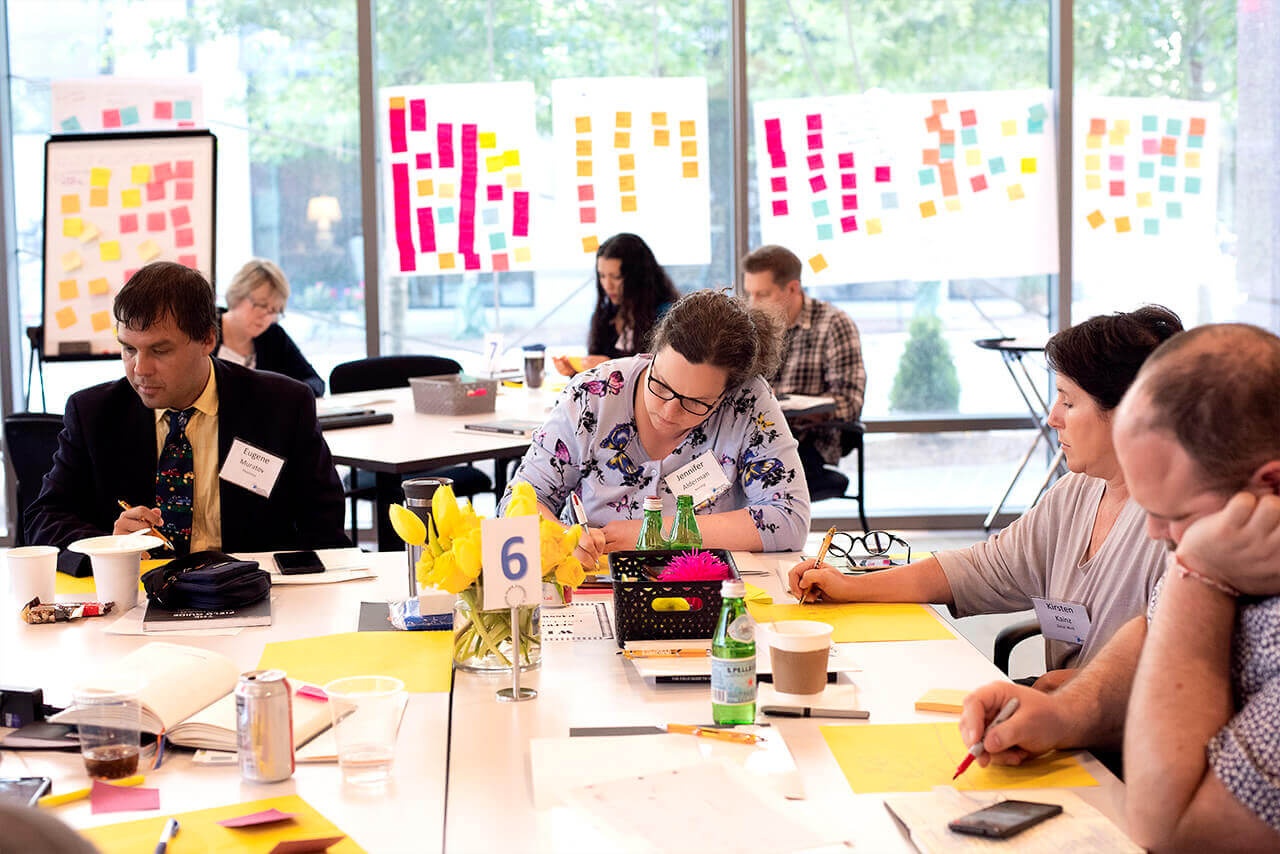

Even during a global pandemic, faculty continue to create and innovate. Learn how Innovate Carolina supports faculty through its diverse resources, connections and partnerships as faculty seek to disrupt with innovative ideas and research-driven solutions.

During the ongoing COVID-19 crisis, University of North Carolina at Chapel-Hill faculty find that they must not only innovate faster, but in a much different way. In this new normal, Innovate Carolina – the University-wide initiative for innovation and entrepreneurship – has rapidly reimagined and brought online a diverse hub of programs, services and tools designed to support faculty innovators who are passionate about making a social and economic impact with their ideas. Many are focused on solving COVID-related problems, while others have entrepreneurial ideas that demand new thinking in a world where higher levels of virtual connections and interdisciplinary collaboration are essential.
Through a three-part series, Innovate Carolina will explore how faculty are engaging with our innovation hub in new ways as they develop ideas, projects and ventures during the pandemic period. We’ll take a look at the resources that some of the University’s most innovative researchers are using to advance ideas through design thinking and ideation, entrepreneurial mentoring and startup services, and opportunities to move innovations to scale.
As faculty grow their startup ventures, how do they move their innovation to scale? Where can they find funding or help with grants? Should they join an accelerator? Innovate Carolina, the University-wide initiative for innovation and entrepreneurship, has created an innovation services hub to help faculty translate ideas into action and take their innovations further, faster.
For faculty focused in startups based on intellectual property developed at the University, KickStart Venture Services (KVS), a core program of Innovate Carolina, is a go-to resource. With a history of making an incredible impact on startups and housed within the UNC Office of Technology Commercialization, KVS offers a variety of services: from the coaching, advisement and connections it normally provides to pandemic-specific support like helping companies pivot existing life science technologies toward COVID-19, write grants for COVID-related federal grants and plan for future physical space needs.
“There are a number of ways KickStart is working to support faculty in their UNC spinout companies,” says Mireya McKee, Interim Director of KVS. “From coaching, mentoring and connections with advisors to high-impact, early-stage funding, we provide faculty with the tools they need be successful.”


Startup accelerators
The newly opened KickStart Accelerator provides a great home for startups, offering space designed to foster collaboration and encourage innovation. The 7,500-square-foot accelerator offers wet lab and office space for UNC-affiliated life science companies. Located in the Genome Science Building in the heart of UNC’s campus, the accelerator offers desk space, shared equipment, cubicles, meeting spaces and common areas that encourage collaboration. Currently, the accelerator hosts four startups with additional companies scheduled to move in over the next six months.
One startup currently in the accelerator is Triangle Biotechnology, a company working to improve the performance of sonication solutions for biological sample processing.
“Participating in the accelerator program has given us the opportunity to grow in size and personnel without spending a fortune on essential lab equipment and resources. The KVS staff are very supportive of our company goals and timeline and are always ready to help in anyway needed,” says Sunny Kasoji, chief technology officer at Triangle Biotechnology, which is working to improve the performance of sonication solutions for biological sample processing. “The accelerator has a combination of open lab benches and private rooms which can fit the basic needs of any biotech start-up company. I would absolutely recommend joining the accelerator and think it is an invaluable resource for new UNC companies.”
Faculty can also apply to join the Launch Chapel Hill, the international award-winning accelerator created via a partnership between UNC-Chapel Hill, the Town of Chapel Hill and Orange County. While Launch Chapel Hill is open to a wide array of entrepreneurs beyond faculty – including students and many non-UNC founders in the community – the chance for faculty to join the accelerator and cross-pollinate ideas with ideas with entrepreneurs beyond campus can expand their business horizons. Launch Chapel Hill’s accelerator program offers a combination of working space, mentorship, technology resources and entrepreneurial community connections that add up to an environment that’s an opportune place for faculty startups to develop and grow. “We provide faculty entrepreneurs with the tools and resources they need to launch and establish their early-stage startups,” says Program Director Velvet Nelson, Launch Chapel Hill. “Our team of entrepreneurs-in-residence help faculty gain access to the resources, community, and mentorship they need to successfully launch companies to benefit the greater good.”
Early-stage funding resources
When faculty are developing IP-based technologies, a targeted amount of funding can make a huge impact. In recent years, an increasing number of faculty have turned to the Technology Development Grant initiative sponsored by Innovate Carolina’s Office of Technology Commercialization (OTC). These grants help faculty advance the development of promising technologies to commercially relevant endpoints. With just a few thousand dollars put to work in the right way, researchers find that what may not have been possible before suddenly is: completing a project that results in a technology that is more likely to be patented and licensed to a commercial entity. More than 20 UNC-Chapel Hill faculty have received nearly $600,000 in technology development grants to move their ideas forward.
Funding in the early stages of startups is also crucial, and the KVS team helps with funding in a variety of ways. The KickStart Commercialization Awards help early-stage companies meet commercial milestones either on the technical side (prototype development, animal studies) or on the business side (regulatory pathway, freedom to operate). The awards enable startup companies to complete high-impact projects as they translate and bring intellectual property and innovations owned by UNC-Chapel Hill to market. Offered to Carolina IP-based companies, the KVS Commercialization Awards range from $5,000 to $50,000 depending on the company’s needs. The grant award enables the companies to build prototypes, obtain preliminary data for government grant applications or launch beta programs.
In addition, KVS helps with SBIR/STTR grants and connections with venture capitalists and angel networks. Offered by the National Institutes for Health, the Small Business Innovation Research (SBIR) and Small Business Technology Transfer (STTR) programs are highly competitive programs that encourage domestic small businesses to engage in federal research/research and development (R/R&D) with the potential for commercialization. As of June 2020, KVS provided consulting and $2.5 million in awards to 98 IP-based startups. These companies went on to raise $72.9 million in non-dilutive SBIR/STTR grants and $862 million in dilutive equity funding.
Grant writing and educational services
Navigating grant applications can be time consuming for faculty founders – time they don’t have between their full-time teaching and research responsibilities and the demands of growing a startup. KickStart Venture Services helps faculty through the grant writing process by connecting them with professional grant writing firms that can assist them with the process of grant writing. And, based on the returns faculty see, working with KVS on their grant-writing process pays off.
“From our research, companies that submit a proposal on their own behalf have about an 11 percent success rate,” says McKee. “However, for companies that use our grant writing services, the percentage of success is closer to 50 percent. You can really see the impact our grant writing services can have for startups.”
As the KVS team has learned, grant dollars aren’t the only resources that faculty founders seek. They’re constantly looking for opportunities to learn about building and growing startups. In response to this need, KVS launched KickStart Presents, an interactive webinar series that bridges the knowledge gap for founders by exploring timely topics. Faculty can sign up for these free webinars and explore topics that include: fundraising, early product development, founders’ equity and how startups can support startups. All webinars can be accessed anytime, anywhere via YouTube.
Advisory and investment programs
After hearing that startup companies could use additional advice beyond funding, KVS also launched an advisory meetings service, a new forum where startups can connect with experts for guidance – from board membership vetting and regulatory advice to help with grant applications. The KVS advisors are industry experts and serial entrepreneurs who have expertise in specific industry verticals and with startup companies.
The meeting format is convenient for both startups and experts: startup companies present for 10 minutes and then answer questions from the advisors. Startups then receive recommendations for how to move forward, while making key connections with experts.
“We’re trying to bring in experts from the regulatory fields, people that can provide advice to companies virtually to help them strategize next steps for bringing therapies or products to the market,” says McKee. “For example, the University is now an affiliate university for AdvaMed, one of the biggest medical device associations. Bringing in additional advice and connections for startups brings a powerful system of support for faculty.”
In addition, KVS connects startup ventures with Carolina Angel Network (CAN), which not only invests in promising UNC-connected companies, but also works as a conduit for companies to seek expert advice from its members. CAN, the only official angel investor network for startups and ventures affiliated with UNC-Chapel Hill, now boasts more than 180 member investors who have invested over $13 million in 19 companies since late 2016.
The CAN network is comprised of successful alumni, donors and friends of UNC who are passionate about helping early-stage companies with UNC ties. In working with CAN through their mentor program, faculty and UNC affiliated entrepreneurs can connect with member investors and entrepreneurs to talk through financial strategies and other business strategies. Once startups are developed enough to seek an investment, CAN represents an unparalleled opportunity for critical funding and longer-term connections to a network of Tar Heel investors and mentors.
“Most early-stage startups face funding gaps, and we are committed to being part of that valuable solution for UNC affiliated startups, including Carolina faculty founders and entrepreneurs,” says CAN Co-Managing Director Chelsea Eshraghi. “With nearly than 200 diverse members in the CAN network, we offer valuable providing introductions, expertise, act as valuable Board members and advisors and put together financing rounds.”
The Innovate Carolina team also introduces faculty to the Carolina Research Venture Fund, which provides critical discovery and development capital to UNC startups. With initial committed capital of $10 million from the UNC Health system, the fund has invested in eight companies since its inception. Two of these have been realized with attractive rates of return. In 2019, the University and UNC Health system committed an additional $10 million to the fund.
Are you a Carolina faculty member with an idea or venture to explore? Visit Innovate Carolina’s innovation services hub to get started.